
Tomorrow marks two years of Russia’s special military operation in Ukraine. My own assessment of what has been accomplished over the past 24 months differs a great deal from what we’ve been told by both mainstream and alternative media.
To put it simply, I contend that everyone is losing this war. Except for the space lizard oligarchs, of course. They are winning bigly.
I’ve been saying this since the first week of the SMO. And each time I make this argument, I receive messages (some more constructive and thoughtful than others) telling me that I am horribly mistaken and that I should listen to Scott Ritter.
I would like to take this opportunity to explain why I don’t agree with Scott Ritter’s assessment of the SMO.
You are welcome to agree with Mr. Ritter—that’s A-OK. I just want to explain why I do not agree with him.
Knocking on Kiev’s door
Like many analysts, Ritter described Russia’s semi-encirclement of Kiev in the opening days of the SMO as a “decapitation” operation.
“Ukraine is getting schooled in the art of Urban warfare. Russia is advancing inside Kiev, a city of 3 million. It took the US a week to take Fallujah, a city of 200,000,” Ritter wrote on February 25, 2022.
With each passing day, Ritter became more confident that Kiev would soon “fall”.
February 28: “Pro hint for the citizens of Kiev: if you have one of those free weapons your President handed out, are filling Molotov cocktails, or planning on using them…you’re not a civilian. You’re an unlawful combatant (franc tireur) subject to summary execution. Good luck!”
March 1: “All of the cable news military ‘experts’ are just now waking up to the fact that Russia’s ‘failed’ invasion is on the cusp of encircling the main Ukrainian military concentration in the east, and knocking at Kiev’s door. CIA propaganda can only be sustained for so long.”
March 4: “Lvov is the heart of this cancer. There cannot be de-Nazification without Russia taking that city and purging this poison. Just a heads up for those who think this ends when Kiev falls.”
When the knockout blow failed to materialize, Ritter began chastising anyone with the chutzpah to suggest that the Russian military had ever intended to take Kiev.
“What makes you think Russia wants to get involved in a street fight for Kiev? Maybe the strategy is to put enough pressure on Kiev to force Ukraine to fight on a fourth front, complicating an already difficult logistical and operational situation? But you’re the chess master…”, Ritter tweeted at historian Edward Luttwak on March 18.
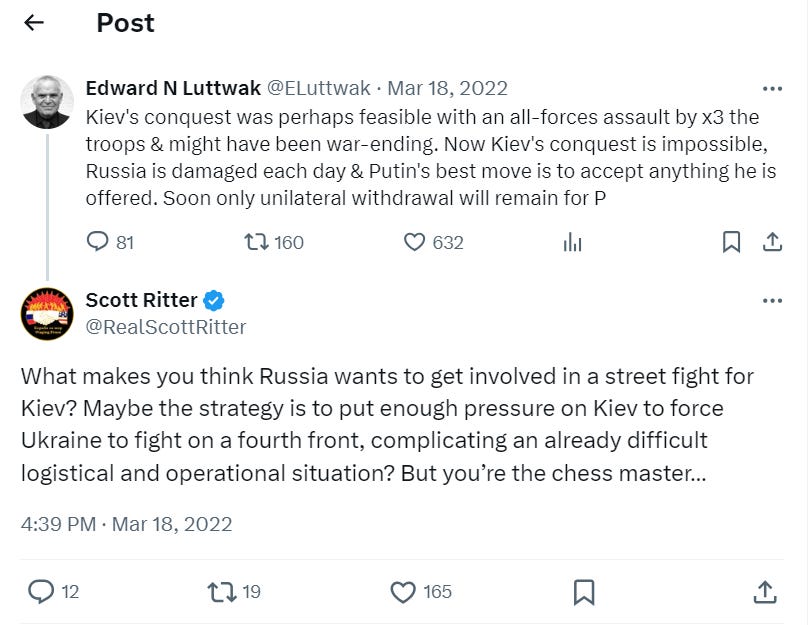
“First it was ‘Russia doesn’t have enough troops to take Kiev.’ Then it was ‘Russia has failed because it didn’t take Kiev.’ Never ‘Russia conducted a successful strategic fixing operation around Kiev’,” Ritter opined on March 27.
Two days later, Ritter revealed that the encirclement of Kiev had been a masterfully executed “feint” designed to pin down Ukrainian forces as Russian troops swiftly liberated Donbass—what Ritter described as “big arrow” warfare.
The Big Arrow
Ritter began test-driving his “big arrow” theory in mid-March 2022 and at the end of the same month he published a 16-tweet thread explaining how Russia was executing an exemplary “Big Arrow War”:
Big Arrow War—a primer. For all those scratching their heads in confusion, or dusting off their dress uniforms for the Ukrainian victory parade in Kiev, over the news about Russia’s “strategic shift”, you might want to re-familiarize yourself with basic military concepts.
Using “feints, fixing operations, and deep attack”, Russia had out-maneuvered Ukraine’s numerically superior forces while avoiding a “classical attritional conflict”, Ritter explained. Russian troops around Kiev were now being “redeployed” to assist in the complete destruction of UAF in East Ukraine:
Russia is redeploying some of its premier units from where they had been engaged in feint operations in northern Kiev to where they can support the next phase of the operation, namely the liberation of the Donbas and the destruction of the main Ukrainian force in the east.
A week after Ritter published his Big Arrow treatise, Kremlin spokesman Dmitry Peskov announced on April 6 that Russian troops were pulling out from Kiev as a “gesture of goodwill” to create favorable conditions for peace talks with Zelensky.
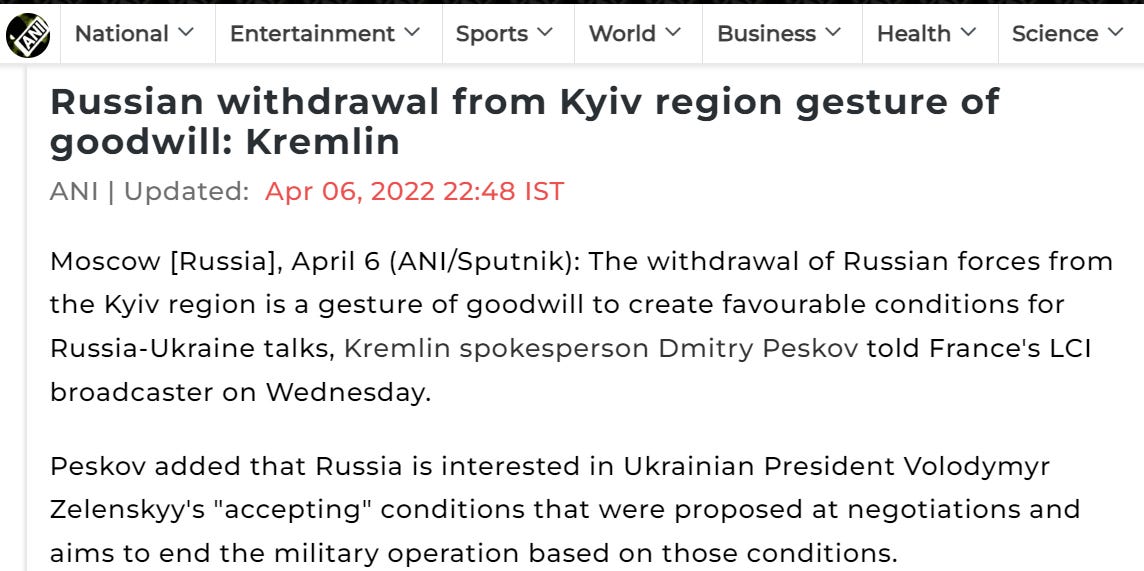
Three days later, on April 9, Ritter said that Russia was weeks away from “strategic victory” in Ukraine.
“The Ukrainian conflict is a proxy war, but one which Russia is poised to win decisively. While there appears to be a NATO/western plan to embroil Russia in a ‘new Afghanistan’, I don’t see any risk of this conflict dragging on for more than a few more weeks at the most before Russia accomplishes a strategic victory over Ukraine,” Ritter said in an interview with Strategic Culture Foundation.
Almost two years have passed and the “liberation of Donbass” is still a work in progress. The Ukrainian military controls territory in Donetsk, Lugansk, Kherson, and Zaporozhye—the four regions incorporated into the Russian Federation in autumn 2022.
There was no “feint”. As Putin explained in his interview with Tucker Carlson, the Russian military left Kiev at the request of Moscow’s trusted Western partners—only to get rug-pulled, again.
Ritter was certainly not alone in believing that Russian troops encircled Kiev in order to force a quick capitulation. But when that plan ultimately failed, Ritter pretended that he never believed all the things he said he had believed, and then wagged his finger at anyone who didn’t understand the brilliance of the Kiev “feint”—which existed only in his mind.
Then something very curious happened. Ritter changed his mind.
Scott Ritter's “Switcheroo”
In May 2022, Scott Ritter shocked independent media by claiming that Western military aid to Ukraine was a “game changer”.
Ritter explained that he had been operating under the assumption that Moscow would be able to “interdict the vast majority of this equipment, but Russia had shown itself unable or unwilling to do this and—as a result—the Ukrainians were having meaningful impact on the battlefield.” If Moscow can’t find a way to stop this, the conflict may never end, Ritter warned.
But he didn’t stop there. In an op-ed published on May 18, 2022, Ritter wrote that “the failure of the invasion to deliver a knockout blow to the Ukrainian government has altered the political-military landscape”. The liberation of Donbass was inevitable and imminent, but “the stated Russian political objective—securing a neutral Ukraine—has not been accomplished,” Ritter noted. In fact, the conflict was bringing Ukraine and NATO closer together, a scenario that the SMO was supposed to prevent:
While it seems clear that Ukraine will not be formally joining Nato any time soon, if ever, the reality is that the war has reforged the relationship between Ukraine and the trans-Atlantic alliance in a way that transforms the way the two entities work together. Ukraine’s current status as a wartime non-Nato ally has strengthened a long-held goal of the US and Nato of neutralizing Russia as a long-term military threat to Europe—in short, by transforming Ukraine’s military into a de facto Nato proxy.
Ritter was even more explicit in an interview with Sputnik on May 22:
[W]hen Russia finishes phase two [the liberation of Donbass], they’re still going to be confronted with a hostile Ukraine that is more closely linked to NATO’s today than they were when the conflict started. And with a NATO that is not willing to roll over and accept Russia’s demands regarding a new European security framework where both sides can live in peace together, but rather which is focused on destroying Russia and Ukraine through continued nonstop combat operations. Which means that Russia better have a phase three in mind because this war isn’t over when they finish with phase two.
In an op-ed published by Consortium News on May 30, Ritter argued that even after Russia defeats the Ukrainian military in Donbass—which he said would happen “at some point soon”—Moscow would still be left with “a number of unfulfilled political objectives” in Ukraine:
[O]nce Russia has fulfilled its stated objective of liberating the breakaway republics, demilitarization will still not have taken place. Moreover, given the fact that demilitarization is premised on Ukraine being stripped of all NATO influence, including equipment, organization, and training, one can make a case that Russia’s invasion has succeeded in making Ukraine a closer partner of NATO than before it began. […]
At some point soon, Russia will announce that it has defeated the Ukrainian military forces arrayed in the east … But [this] will leave Russia with a number of unfulfilled political objectives, including denazification, demilitarization, permanent Ukrainian neutrality, and NATO concurrence with a new European security framework along the lines drawn up by Russia in its December 2021 treaty proposals. If Russia were to call a halt to its military operation at this juncture, it would be ceding political victory to Ukraine, which “wins” by not losing.
Russia has not defeated the UAF in East Ukraine and all of the unfulfilled political objectives of the SMO are still unfulfilled.
Russian Foreign Minister Sergei Lavrov warned about this exact scenario. In a 2018 interview, Lavrov said that a war to defend Donbass would result in Russia “losing the rest of Ukraine”. In other words, a war between Russia and Ukraine would cement Ukraine’s transformation into a NATO-backed anti-Russia. According to Putin, a key objective of the SMO was to prevent the formation of a “hostile anti-Russia” in Ukraine.
Ritter made an admirable attempt at focusing on whether or not the SMO’s stated goals were actually being achieved. But by doing so he ran afoul of the scientific consensus in alternative media (“whoever kills the most proles wins the war”). Within a month, Ritter was back to his old routine.
“To the extent Ukraine is seeking to delay the Russian advance, it is being done by the full-scale sacrifice of the soldiers at the front … This is the ugly truth about Ukraine today—the longer the war continues, the more Ukrainians will die, and the weaker NATO will become,” Ritter wrote for Consortium News on June 25, 2022.
A “strategic Russian victory” in Ukraine was just around the corner, again, he reassured his readers.
(Six months later, Ritter would offer a moral justification for keeping the bloodbath going: “[T]here is nothing nice about the people in Ukraine … They are either staunch supporters of the odious ideology of Stepan Bandera, and as such deserving of whatever fate befalls them, or pathologically indifferent cowards who have facilitated the horrific crimes of the Banderists.”)
“Russia has lost nothing more than some indefensible space”
Ritter scoffed at Ukraine’s counter-offensive in autumn 2022. In fact, Russia’s retreat from Kharkov and Kherson was actually a defeat for the UAF.
“It appears that Ukraine [will] exhaust its carefully gathered reserve forces before the bulk of Russia’s response engages,” Ritter wrote on September 9. He was convinced that the UAF had fallen into a deadly trap:
The Kherson offensive appears to have stalled, and whether by design or accident, the Kharkov offensive is shaping up to become a trap for the Ukrainian forces committed, who find themselves in danger of being cut off and destroyed.
At the end of the day, this counteroffensive will end in a strategic Ukrainian defeat. Russia will restore the front to its original positions and be able to resume offensive operations. The Ukrainians, meanwhile, will have squandered their reserves, limiting their ability to respond to a new Russian advance.
When it became clear that the UAF wouldn’t be boiled alive in a giant sneaky tactical cauldron, Ritter insisted that Kharkov was useless and Russia had actually gained the upper hand by retreating.
In Kharkov, Russia had “lost nothing more than some indefensible space. Russian casualties were minimal, and equipment losses readily replaced,” Ritter wrote on September 12. He explained:
Russia has actually strengthened its military posture by creating strong defensive lines in the north capable of withstanding any Ukrainian attack, while increasing combat power available to complete the task of liberating the remainder of the Donetsk People’s Republic under Ukrainian control.
A few days later, Ritter announced that the gloves were coming off: Putin’s decision to order partial mobilization on September 21, which coincided with referendums in East Ukraine, meant that the SMO had been upgraded from a “limited-scope operation” to one “linked to the existential survival of Russia”.
As Ritter explained on September 22, once East Ukraine was formally incorporated into the Russian Federation, an attack on Donetsk—or any of the other new regions—would mean an attack on Mother Russia:
All Ukrainian forces that are on the territory of the regions to be incorporated into Russia will be viewed as occupiers; and Ukrainian shelling of this territory will be treated as an attack on Russia, triggering a Russian response. Whereas the SMO had, by design, been implemented to preserve Ukrainian civil infrastructure and reduce civilian casualties, a post-SMO military operation will be one configured to destroy an active threat to Mother Russia itself. The gloves will come off.
It was all over. Speaking on a podcast on October 14, Ritter prophesied, again, that a decisive Russian victory in Ukraine was just a few months away:
This isn’t going to take another year-and-a-half. This is going to take at most several months. I said the last time we talked that Russia will wrap up this militarily by the end of summer, and that it will all be over by the fall of 2023. I stand by that. The only way I think I might be wrong is it might end a little bit sooner.
He was wrong.
When Russian forces withdrew from Kherson a month later, Ritter yawned. The UAF, which was now in control of the capital of a newly incorporated Russian region, had accomplished nothing more than a disastrous Pyrrhic victory.
“Russia … is in the process of finalizing the organization, training, and equipping of 200,000 fresh troops. When they arrive on the battlefield sometime in December, Ukraine will be hard pressed to respond in a meaningful fashion. Like Pyrrhus, Ukraine, in taking Kherson, has been ‘utterly ruined’,” Ritter wrote on November 10.
Five days later, Ritter said Russia’s patience had run out.
“Ukraine’s going to have to accept reality. It has permanently lost Kherson, Zaporizhzhia, the Donbass, and Crimea. You will never get it back, Ukraine. Never, ever, ever in a million years. And if you continue this fight, very soon you’re going to lose Odessa. You’re going to lose Kharkov, and you will never get them back. You will lose Mykolaiv, you’ll lose Dnipropetrovsk, you’ll lose your very existence. You’ll never get it back, ever. Russia’s reached a point where it is not in a mood to negotiate,” Ritter told the Real News Network.
The gloves did not come off and Kherson is now a massive concrete fortress.
Contrary to what Ritter claimed, the withdrawal from Kharkov did not strengthen Russia’s military posture. Quite the opposite. The retreat allowed Ukrainian artillery to shell Belgorod and other Russian cities and towns located near the border.
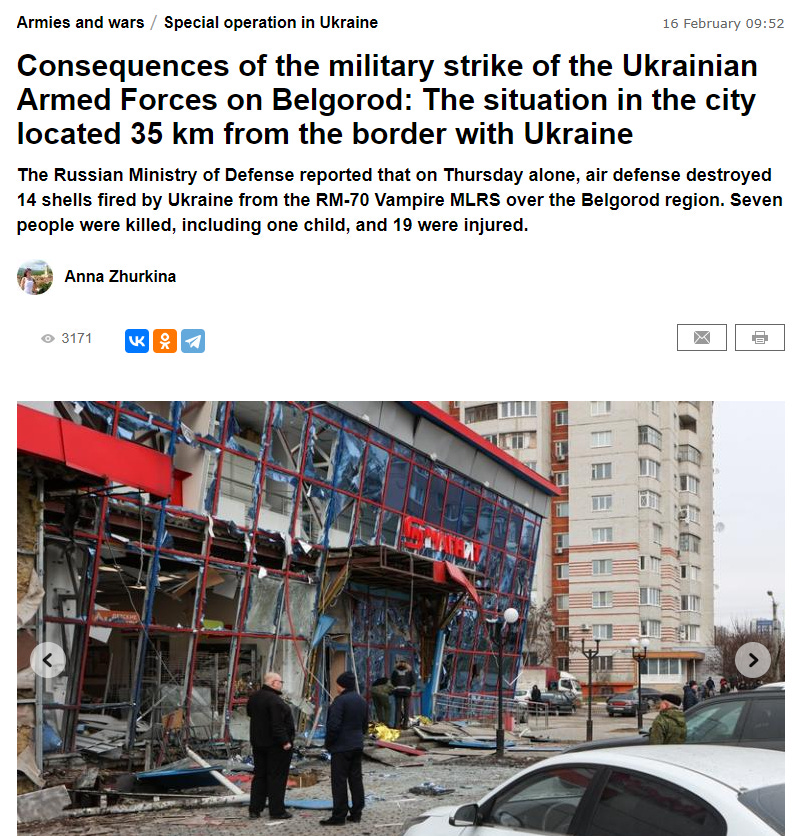
Coincidentally, Scott Ritter’s popular Telegram channel returns zero results when you search for “Belgorod”.
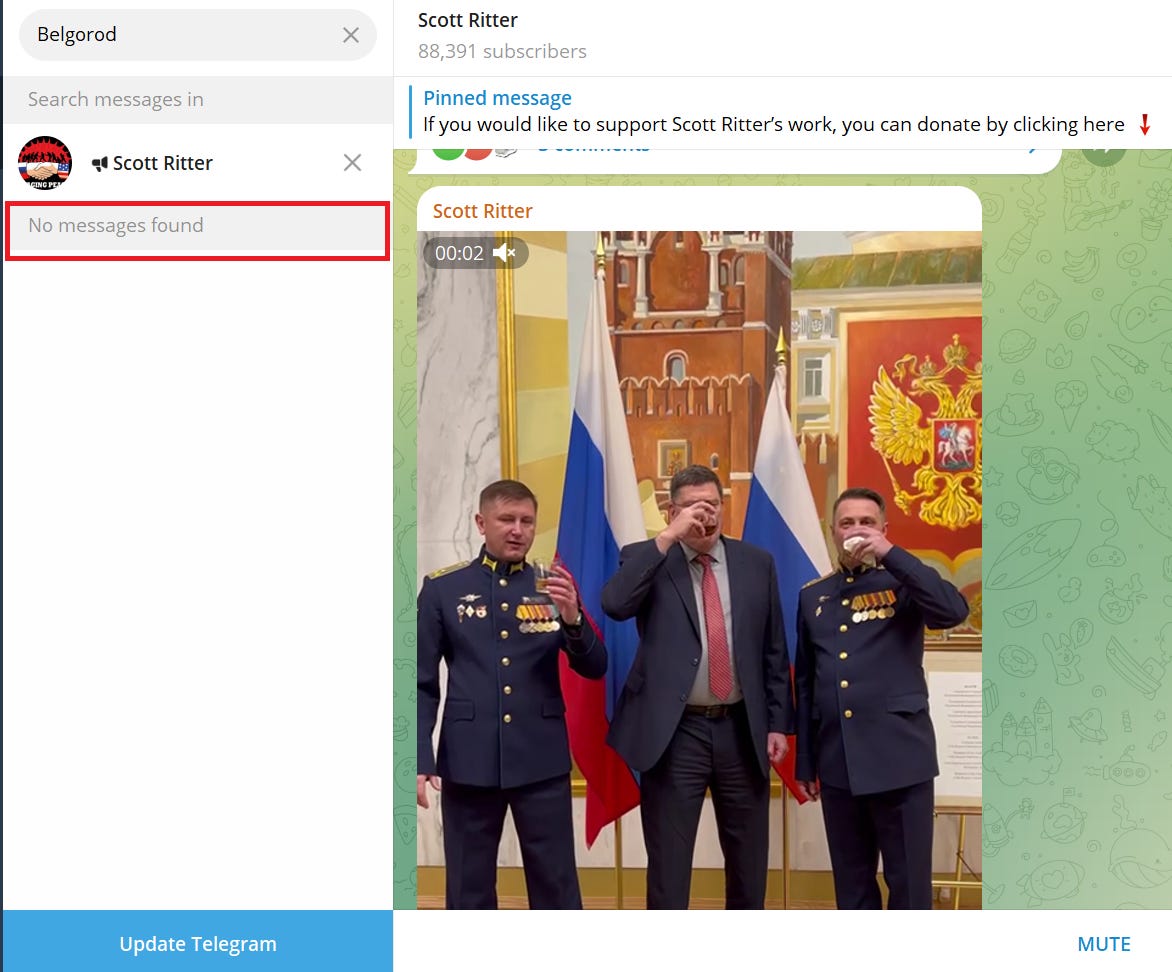
ALERT MEMORANDUM
Final preparations were being made for Russia’s final victory, Ritter said in a video message published on January 16, 2023.
Ten days later, Ritter and his colleagues from Veteran Intelligence Professionals for Sanity (VIPS) warned US President Joe Biden that he wasn’t prepared for what was “coming” in Ukraine:
It has long been clear that you have not been adequately briefed on two issues of major importance: (1) the war in Ukraine, and (2) the strategic partnership between Russia and China. We chose this genre of “ALERT MEMORANDUM” because we want to prepare you for a major shock. Russia’s winter offensive is about to roll over the Ukrainian army. At that point, unwelcome choices will have to be made. Off-ramps must be sought – again, the sooner the better.
Your intelligence advisers seem blissfully unaware of what is coming.
Russia’s winter offensive ended in Bakhmut, the nine-month “meatgrinder” that was supposed to be the final nail in the UAF’s coffin. To Ritter’s credit, he demonstrated restraint by observing that it wasn’t yet clear how taking the city “fits into the overall pace of the conflict”.
Then Ritter suffered a serious relapse.
Ukraine risked losing up to 50% of its territory if Zelensky continued to refuse negotiations, Ritter said at the end of May 2023.
“Much will depend on when Ukraine starts negotiations. If it continues in the same spirit, it is difficult to say whether it will be able to maintain control over Odessa, Kharkov and Dnepropetrovsk,” he noted.
It’ll all be over by the end of summer 2023 by the end of 2023 autumn 2024, according to Ritter.
January 14, 2023: “Russia will win this year. Of course, the Russian leadership does not make any commitments on the timing, but I am talking about this as an independent analyst.”
July 17, 2023: By the end of summer, the UAF will no longer be a functioning military force.
September 12, 2023: “There is a depletion of supplies along the entire front line, which could lead to the defeat of the Ukrainian army in the coming weeks or months.”
October 11, 2023: The Ukrainian military will collapse within the next twelve months.
January 6, 2024: “Everything will end by September. When everything is over, the map of Ukraine will not look like it does now. Odessa, Nikolaev, Dnepropetrovsk, Kharkov will also be territories of Russia.”
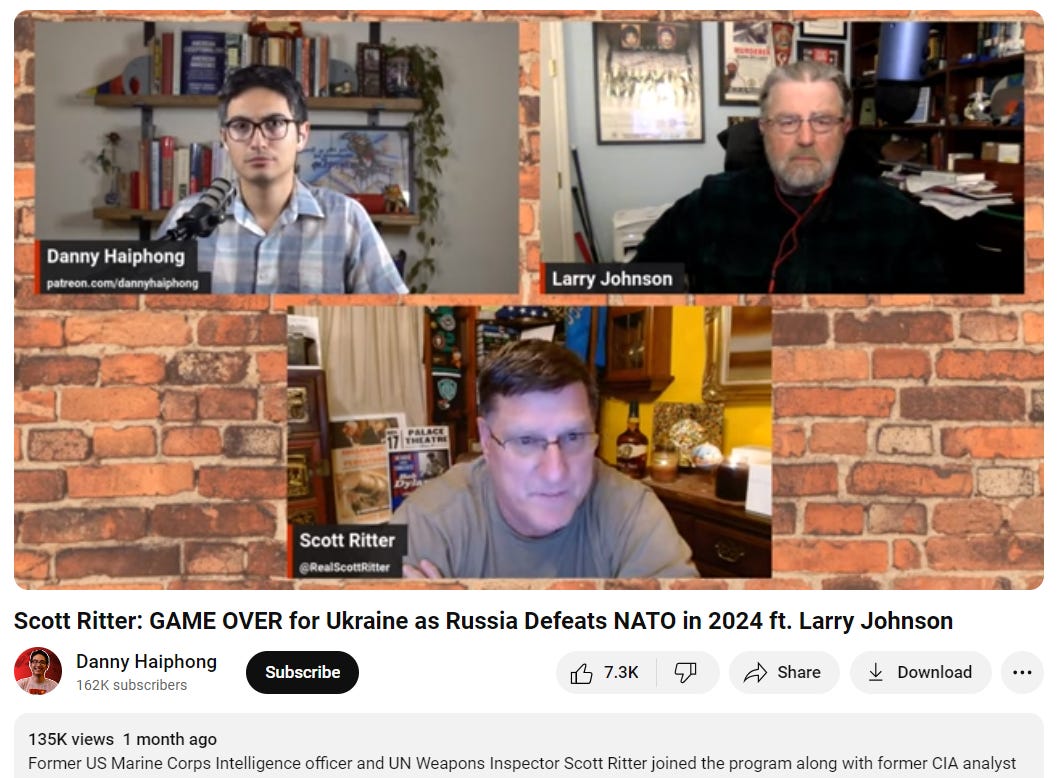
In recent weeks, Ritter and likeminded experts have pointed to the failed Ukrainian offensive, combined with the UAF’s withdrawal from Avdiivka, as evidence that Ukraine will soon be forced into an unconditional surrender.
Pushing the UAF out of Avdiivka is a positive step towards protecting Donetsk. But the operation was hardly a cakewalk (it took several months) and as Russell Bentley noted, the UAF is still able to shell Donetsk from other positions.
“[Taking Avdiivka] moves the front line away from the city limits; secondly, it opens up space for our fighters in the southwestern direction. Just don’t delude yourself. There is still a lot of work ahead,” Bentley wrote February 21.
The SMO is entering its third year and Ukrainian forces are still being dislodged from the suburbs of Donetsk. Is this what Imminent Total Victory looks like? I would say: no. But that’s just my opinion.
Here’s where things currently stand:
The stated Russian political objective—securing a neutral Ukraine—has not been accomplished.
Given the fact that demilitarization is premised on Ukraine being stripped of all NATO influence, including equipment, organization, and training, one can make a case that Russia’s invasion has succeeded in making Ukraine a closer partner of NATO than before it began.
At some point soon, Russia will announce that it has defeated the Ukrainian military forces arrayed in the east. But this will leave Russia with a number of unfulfilled political objectives, including denazification, demilitarization, permanent Ukrainian neutrality.
Scott Ritter knows all of this because I copy-pasted those bullet points from articles written by Scott Ritter, who wrote those things even while under the assumption that Donbass would be 100% controlled by Russia by the end of 2022.
For mysterious reasons, Scott Ritter is now writing very different things: Killing Ukrainians makes NATO weak … Ukrainians aren’t even good people, anyway … Next stop: Odessa … Total Victory is close at hand … Just two more weeks … Just two more weeks…
Like I said: I don’t agree with Scott Ritter.


I agree completely that no one is “winning” here except the lizards.
My heart bleeds for the country of my forebears…
I had never heard of Scott Ritter before the start of the SMO, then he was pushed very hard in the alternative media space. He had previously been arrested for child sex crimes twice. Given his awful and ongoing predictive abilities and his clear unwillingness to address them or update his worldview, I think his pro-Russia hopium grift is likely part of an ongoing operation (CIA?) to control both sides of the conversation around the war.